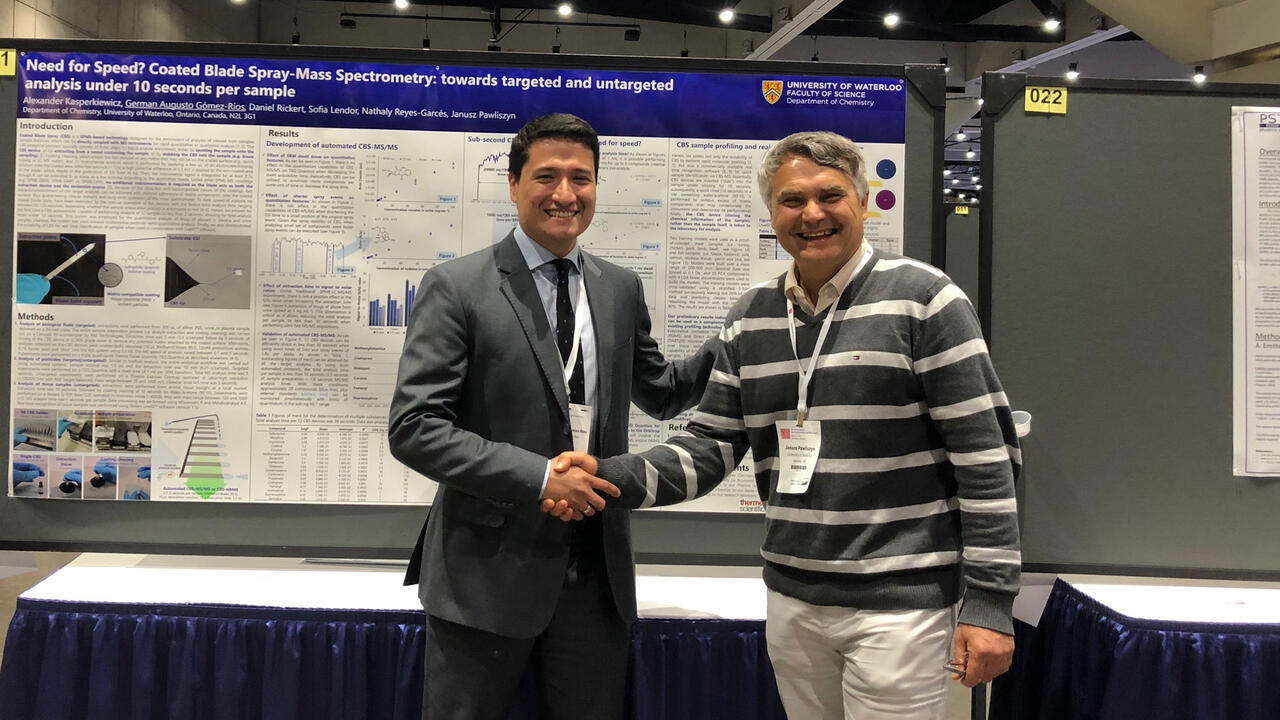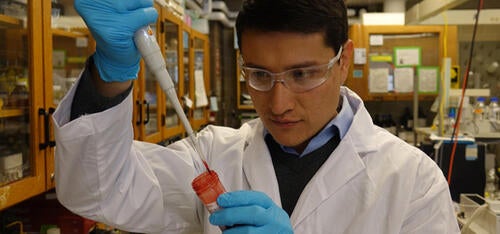
Waterloo graduate student earns Governor General’s Academic Gold Medal
PhD candidate German Augusto Gómez-Rios wins prestigious award for his outstanding academic record and research.

PhD candidate German Augusto Gómez-Rios wins prestigious award for his outstanding academic record and research.
By Lucas Dunlop University RelationsThe University of Waterloo is proud to announce that one of its former Department of Chemistry students, German Augusto Gómez-Rios, will receive one of Canada’s most prestigious academic awards at Spring convocation: the Governor General’s Academic Gold Medal.
Created in 1873 by Canada’s third Governor General Lord Dufferin, the Governor General’s Academic Medal is an award given out annually to students from different institutions who achieve the highest level of academic scholarship for their cohort at their institution. The award is divided into four categories ranging from bronze at the secondary school level to gold at the graduate level. German Augusto Gómez-Rios, now a postdoctoral fellow in the department of Chemistry and part of the Pawliszyn Research Group, specializes in developing and improving analytical technologies for rapid analysis of a variety of organic substances.
Already an author on more than 30 peer-reviewed journals articles, Gómez-Rios has succeeded in improving a number of methods related to solid phase micro-extraction (SPME), an analytical method developed by Janusz Pawliszyn in the 1990s that uses a solid coating to selectively extract small molecules. For example, he streamlined analytical protocols that will allow doctors and surgeons in the near future to provide individualized patient treatment, and he has succeeded in reducing the time it takes to screen for prohibited substances and drug abuse from 30 minutes to just 10 seconds.
He defended his PhD thesis last fall, and will be receiving his doctoral degree at the Spring 2018 convocation ceremony on Thursday, June 14.
“Honestly, I was surprised my thesis was chosen as there are several grad students at the University of Waterloo working on outstanding projects who also deserve this recognition,” said Gómez-Rios. “I am very grateful to the evaluation committee for selecting me between this group of outstanding people. It feels great to be recognized by my University peers, and it is a strong encouragement to keep working hard and pushing the limits of our developments.”
Gómez-Rios’ supervisor, Janusz Pawliszyn, is no stranger to awards and academic acclaim. Pawliszyn, a Canada Research Chair, a Fellow of the Royal Society of Canada, and recipient of such prestigious awards as the Ontario Premier’s Innovation Award, the Maria Sklodowska-Curie Medal and the Environmental Research and Development Award, has supervised over 100 graduate students and is the author of over 500 scientific publications.
“It was encouraging to see scientific growth of the student over the last seven years to the level deserving this outstanding distinction. We do excellent training at University of Waterloo and Chemistry Department,” said Pawliszyn.

German Augusto Gómez-Rios testing a sample in the Pawliszyn Research Lab.
The Pawliszyn Research Group includes 19 graduate students and postdoctoral fellows. Several members continue to develop SPME methods, creating novel solid coatings and sampling devices that require little to no sample preparation. Combined with advances in portable instrumentation, SPME provides an ideal solution to analyses that can be done rapidly, on-site.
In addition to sports drug testing, the group is also working on drug roadside testing, skin cancer detection, in-vivo brain chemical sampling and pesticide testing. To find out more about the Pawliszyn Research Group, visit their website.
While Gómez-Rios has already accomplished so much in his early career, the 32-year-old said there’s much more to come.
“My dream and personal goal is that the technologies I help conceive and develop during my PhD will one day be used on a daily basis wherever,” said Gómez-Rios. “I am convinced the technologies we’ve developed can do it, but we need to keep working hard to bring them to reality and prove their robustness so they don't become another article on a bookshelf or a web page.”
A more detailed summary of his work can be found in this news release and his profile.

Read more
The Government of Canada announces funding to support research in food policies and medical devices

Read more
Here are the people and events behind some of this year’s most compelling Waterloo stories

Read more
Meet five exceptional Waterloo graduate students crossing the convocation stage as Class of 2025 valedictorians
The University of Waterloo acknowledges that much of our work takes place on the traditional territory of the Neutral, Anishinaabeg, and Haudenosaunee peoples. Our main campus is situated on the Haldimand Tract, the land granted to the Six Nations that includes six miles on each side of the Grand River. Our active work toward reconciliation takes place across our campuses through research, learning, teaching, and community building, and is co-ordinated within the Office of Indigenous Relations.